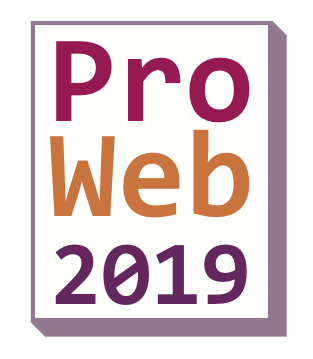 Full-fledged web applications have become ubiquitous on desktop and mobile devices alike. Whereas “responsive” web applications already offered a more desktop-like experience, there is an increasing demand for “rich” web applications (RIAs) that offer collaborative and even off-line functionality —Google docs being the prototypical example. Long gone are the days that web servers merely had to answer incoming HTTP request with a block of static HTML. Today’s servers react to a continuous stream of events coming from JavaScript applications that have been pushed to clients. As a result, application logic and data is increasingly distributed. Traditional dichotomies such as “client vs. server” and “offline vs. online” are fading.
Full-fledged web applications have become ubiquitous on desktop and mobile devices alike. Whereas “responsive” web applications already offered a more desktop-like experience, there is an increasing demand for “rich” web applications (RIAs) that offer collaborative and even off-line functionality —Google docs being the prototypical example. Long gone are the days that web servers merely had to answer incoming HTTP request with a block of static HTML. Today’s servers react to a continuous stream of events coming from JavaScript applications that have been pushed to clients. As a result, application logic and data is increasingly distributed. Traditional dichotomies such as “client vs. server” and “offline vs. online” are fading.
Accepted Papers
Call for Papers
The 3rd International Workshop on Programming Technology for the Future Web, or ProWeb19, is a forum for researchers and practitioners to share and discuss new technology for programming these and future evolutions of the web. We welcome submissions introducing programming technology (i.e., frameworks, libraries, programming languages, program analyses and development tools) for implementing web applications and for maintaining their quality over time, as well as experience reports about the use of state-of-the-art programming technology. Relevant topics include, but are not limited to:
- Quality on the new web: static and dynamic program analyses; code, design test and process metrics; development and migration tools; automated testing and test generation; contract systems, type systems, and web service API conformance checking; …
- Hosting languages on the web: new runtimes; transpilation or compilation to JavaScript, WebAssembly, asm.js, …
- Designing languages for the web: multi-tier (or tierless) programming; reactive programming; frameworks for multi-tier or reactive programming on the web; …
- Distributed data sharing, replication and consistency: cloud types, CRDTs, eventual consistency, offline storage, peer-to-peer communication, …
- Security on the web: client-side and server-side security policies; policy enforcement; proxies and membranes; vulnerability detection; dynamic patching, …
- Surveys and case studies using state-of-the-art web technology (e.g., WebAssembly, WebSocket, LocalStorage, AppCache, ServiceWorkers, Meteor, deepstream.io, Angular.js, React and React Native, Swarm.js, Caja, TypeScript, Proxies, ClojureScript, Amber Smalltalk, Scala.js, …)
- Ideas on and experience reports about: how to reconcile the need for quality with the need for agility on the web; how to master and combine the myriad of tier-specific technologies required to develop a web application, …
- Position statements on what the future of the web will look like
- …
We solicit three kinds of submissions via EasyChair:
- 6-page technical papers and experience reports that, when accepted, will be published in the workshop post-proceedings as part of of the ACM’s Digital Library.
- 3-page position statements that, when accepted, will be published in the workshop post-proceedings as part of of the ACM’s Digital Library.
- 1-page presentation abstracts that, when accepted, will be made available on the website.
Each submission will be reviewed by at least three members of the organizing or program committee. We welcome submissions that identify new problems, or report on promising ideas in early stages of research. Submissions of the first two kinds (cf. above) do need to be original, and cannot have been accepted at or still be under review for other events. Submissions of the third kind are ideal to further disseminate existing ideas within the community, to demonstrate existing tools, or simply to instigate a discussion.
Submissions must follow the ACM Conference acmart Format with the ‘sigconf’ option with a font size of 10 point and the font family Times New Roman. If you are formatting your paper using LaTeX, you will need to set the 10pt option in the \documentclass command. Please include page numbers in your submission for review using the LaTeX command \settopmatter{printfolios=true} (see examples in template).
At least one author of each accepted submission is expected to register for the workshop and present the work. Failure to register will result in the submission being excluded from the workshop post-proceedings. The workshop will take place on April 1st during the
Mon 1 AprDisplayed time zone: Amsterdam, Berlin, Bern, Rome, Stockholm, Vienna change
14:00 - 15:30 | |||
14:00 40mTalk | How Artificial Intelligence Can Improve Web Development and TestingProWeb Invited Talk ProWeb Andrea Stocco Università della Svizzera italiana (USI) | ||
14:40 25mResearch paper | GUI Testing in Production: Challenges and Opportunities ProWeb Giovanni Denaro University of Milano-Bicocca, Italy, Luca Guglielmo , Leonardo Mariani University of Milano Bicocca, Oliviero Riganelli | ||
15:05 25mResearch paper | Orchestrated Crowdsourced Testing of a Mobile Web Application: A Case Study ProWeb Maurizio Leotta DIBRIS, University of Genova, Italy, Vincenzo Petito , Luca Gelati , Giorgio Delzanno DIBRIS, University of Genova, Giovanna Guerrini , Viviana Mascardi DIBRIS, University of Genova, Italy | ||
16:00 - 17:30 | |||
16:00 25mResearch paper | Civic Participation Powered by Ethereum: a Proposal ProWeb | ||
16:25 25mTalk | TryLinks: An interactive tutorial system for a cross-tier Web programming language ProWeb | ||
16:50 30mResearch paper | Web Security Training [at] UniGe: an Experience ProWeb | ||